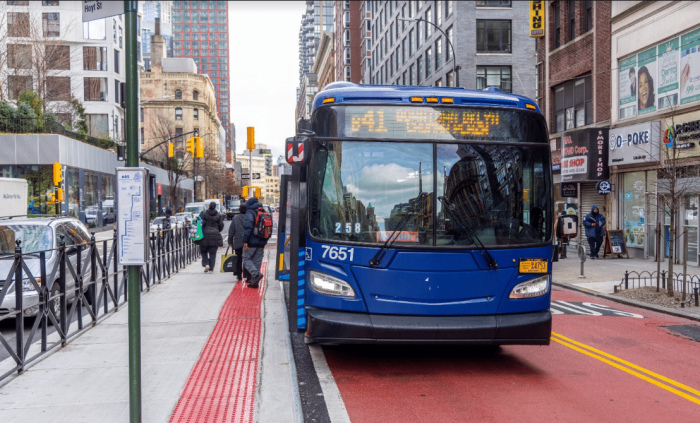By Dustin Brown
The future of the borough’s private bus lines is being decided behind closed doors as city officials negotiate the transfer of the heavily subsidized service to the Metropolitan Transit Authority.
But the private nature of the discussions has left countless questions unanswered as borough leaders wonder whether the final deal would hurt Queens riders.
“Whatever negotiations the mayor’s people are doing with the MTA, they’re just not telling anybody,” said Councilman Tony Avella (D-Bayside), the chairman of the Council’s Zoning and Franchises Committee. “Everyone’s complaining about the MTA … so why would we want to give them these routes and make the situation worse than it is?”
Although a government source told numerous media outlets last week that a deal was imminent, the mayor’s office and MTA insist talks are still underway.
“All I can tell you is negotiations are ongoing on the topic,” said Jordan Barowitz, a spokesman for Mayor Michael Bloomberg.
“No agreement has been reached,” MTA spokesman John McCarthy said.
The city currently subsidizes seven private bus lines, including four in Queens — Triboro Coach, Jamaica Buses, Queens Surface Corp. and Green Bus Lines, the first three of which shut down service during a nearly two-month strike staged last summer by Transport Workers Union Local 100.
One of the central issues in the conflict stemmed from concerns that the drivers and mechanics would lose their job security and pensions if the bus routes were taken over by other carriers when the current franchise agreements expire at year’s end. The strike was only resolved after the City Council approved a resolution pledging not to approve any new bus contracts that did not offer job and pension protection.
The discussions now underway would give the routes not to new companies but to the MTA, a state agency that has come under tremendous scrutiny for approving a major fare hike while refusing to open its books. That legacy is fueling skepticism over the agency’s ability to effectively operate the Queens bus routes.
“If the MTA is indeed going to take over the private bus lines, then they must ensure that Queens riders are not shortchanged in the process with service cutbacks,” said City Councilman John Liu (D-Flushing), who chairs the Council’s Transportation Committee. “We cannot tolerate service cutbacks such as the elimination of bus routes or the wholesale layoffs of bus drivers.”
In the midst of its own massive budget crisis, the city is hoping the transfer would yield cost savings and relieve it of the $165 million it pays in annual subsidies.
“We need to find savings wherever possible,” Barowitz said.
But whether any savings would actually emerge is still unclear.
Avella believes giving the service to the MTA “will not be improving service and in the long run it will not be saving money.”
For its part, Local 100 is demanding that the city subsidies continue in the event of an MTA takeover “to guarantee the best possible service,” union spokesman Dave Katzman said. They also wants its members’ seniority and pensions preserved and service to continue uninterrupted.
Avella is vowing to do what he can to protect the union members, but he is still concerned the mayor could cut a deal that oversteps the Council entirely.
“It’s hard for me to comment on a process where I don’t even know what the process is,” Avella said. “We’re not part of these negotiations, so I don’t know what legal mechanisms the mayor is thinking about how they transfer these routes.”
But the prospect of an MTA takeover is still being greeted with optimism in some corners. Markisha Beckford, the chairwoman of the Southeast Queens Transportation Advisory Committee, thinks service can only get better.
“I think there are going to be definite improvements,” she said. “I think it would go a long way to improving the service if the MTA does take over.”
Reach reporter Dustin Brown by e-mail at Timesledger@aol.com or call 718-229-0300, Ext. 154.































